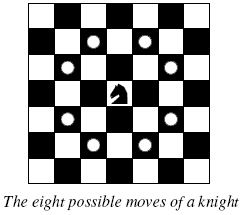A Knight's Journey
| Time Limit: 1000MS | Memory Limit: 65536K | |
| Total Submissions: 39700 | Accepted: 13487 |
Description
 Background
Background The knight is getting bored of seeing the same black and white squares again and again and has decided to make a journey
around the world. Whenever a knight moves, it is two squares in one direction and one square perpendicular to this. The world of a knight is the chessboard he is living on. Our knight lives on a chessboard that has a smaller area than a regular 8 * 8 board, but it is still rectangular. Can you help this adventurous knight to make travel plans?
Problem
Find a path such that the knight visits every square once. The knight can start and end on any square of the board.
Input
The input begins with a positive integer n in the first line. The following lines contain n test cases. Each test case consists of a single line with two positive integers p and q, such that 1 <= p * q <= 26. This represents a p * q chessboard, where p describes how many different square numbers 1, . . . , p exist, q describes how many different square letters exist. These are the first q letters of the Latin alphabet: A, . . .
Output
The output for every scenario begins with a line containing "Scenario #i:", where i is the number of the scenario starting at 1. Then print a single line containing the lexicographically first path that visits all squares of the chessboard with knight moves followed by an empty line. The path should be given on a single line by concatenating the names of the visited squares. Each square name consists of a capital letter followed by a number.
If no such path exist, you should output impossible on a single line.
If no such path exist, you should output impossible on a single line.
Sample Input
3 1 1 2 3 4 3
Sample Output
Scenario #1: A1 Scenario #2: impossible Scenario #3: A1B3C1A2B4C2A3B1C3A4B2C4
思路:dfs生成全排列遍历,注意起点与终点是任意的。因为要求输出是字典序,注意跳跃时的顺序。
#include <cstdio> #include <cstring> using namespace std; const int MAXN=30; int n; int p,q; int dy[8]={-1,1,-2,2,-2,2,-1,1}; int dx[8]={-2,-2,-1,-1,1,1,2,2}; int vis[MAXN][MAXN]; bool mark; void dfs(int dep,int y,int x,char s[]) { if(mark) return ; if(dep==2*p*q) { mark=true; s[dep]=0; printf("%s ",s); return ; } for(int i=0;i<8;i++) { int ny=y+dy[i]; int nx=x+dx[i]; if(0<=ny&&ny<p&&0<=nx&&nx<q&&!vis[ny][nx]) { vis[ny][nx]=1; s[dep]='A'+nx; s[dep+1]='1'+ny; dfs(dep+2,ny,nx,s); vis[ny][nx]=0; } } } int main() { scanf("%d",&n); for(int cas=1;cas<=n;cas++) { scanf("%d%d",&p,&q); printf("Scenario #%d: ",cas); mark=false; for(int i=0;i<p;i++) { for(int j=0;j<q;j++) { memset(vis,0,sizeof(vis)); char s[60]=""; s[0]='A'+i; s[1]='1'+j; vis[i][j]=1; dfs(2,i,j,s); if(mark) break; } if(mark) break; } if(!mark) printf("impossible "); printf(" "); } return 0; }